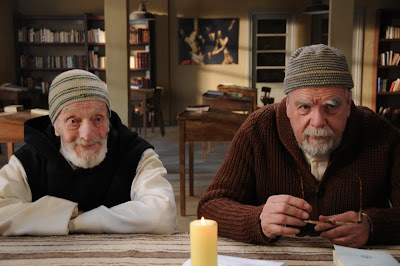Jake Gyllenhaal portrays Coulter Stevens, a young man who wakes up on a Chicago commuter train. The woman seated across from him (Michelle Monaghan) talks to him as if she knows him. But he doesn't know her. Totally confused, Gyllenhaal's character slips into the restroom to regroup. There, the weirdness gets weirder. When he looks in the mirror, the reflection staring back at him belongs to someone else.
As Source Code progresses, we begin to realize (as does Gyllenhaal's character) what's happening, but it's best not to tell too much more about the movie's plot, except to note that Ben Ripley's screenplay has Gyllenhaal repeating the same scenario a number of times.
We learn what's going on at roughly the same pace as Gyllenhaal's Stevens, a veteran of the war in Afghanistan. He begins to grasp that he's on a mission that requires him -- with help from some technology, of course -- to keep returning to that train in eight-minute chunks.
With each trip, Stevens gains more knowledge about how high the stakes are. Bombs, domestic terror and terrible urban destruction lurk in the background.
Although I can't say Duncan totally sold me on the movie's time-bending premise, he keeps the story moving with the inexorable speed of the train Stevens revisits. At its best, Source Code comes at us in vivid bursts; its mood becomes increasingly frantic, partly because its hero must work against inflexible deadlines that up the dramatic ante. It's an old contrivance, of course, but Duncan infuses it with fresh energy.
Gyllenhaal acquits himself well, and Monaghan proves exceptionally appealing as a young woman who believes her life has reached a turning point.
The rest of the cast includes Jeffrey Wright, as a brainy scientist, and Vera Farmiga, as Wright's subordinate. Wright, a wonderful actor, seems wasted in a role that just about anyone could have handled. Farmiga, who has more to do, portrays a character that's a bit of a departure for her, but neither Wright nor Farmiga are likely to press this one into their books of indelible acting memories.
Source Code flirts with joining the ranks of paranoia-prone movies that deal with the ways manipulative governments betray their heroes. Too bad the movie's cop-out ending - really an epilogue - pushes Duncan onto less challenging turf. But Duncan knows how to hold an audience's attention, and Source Code's devotion to creating Hitchcock-style suspense keeps us on edge, which (happy to say) is precisely what movies such as this are supposed to do.











